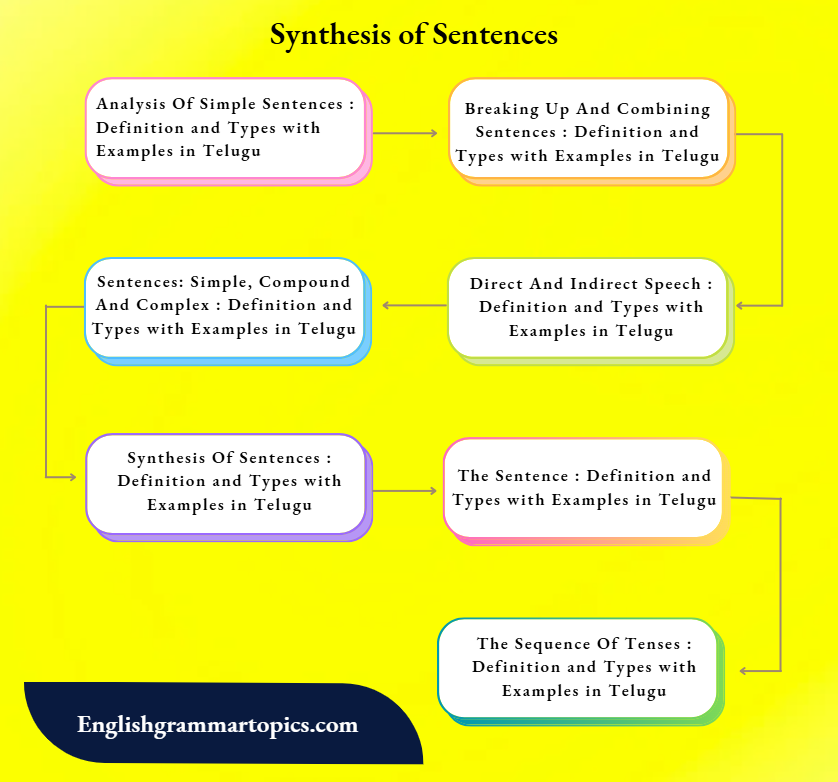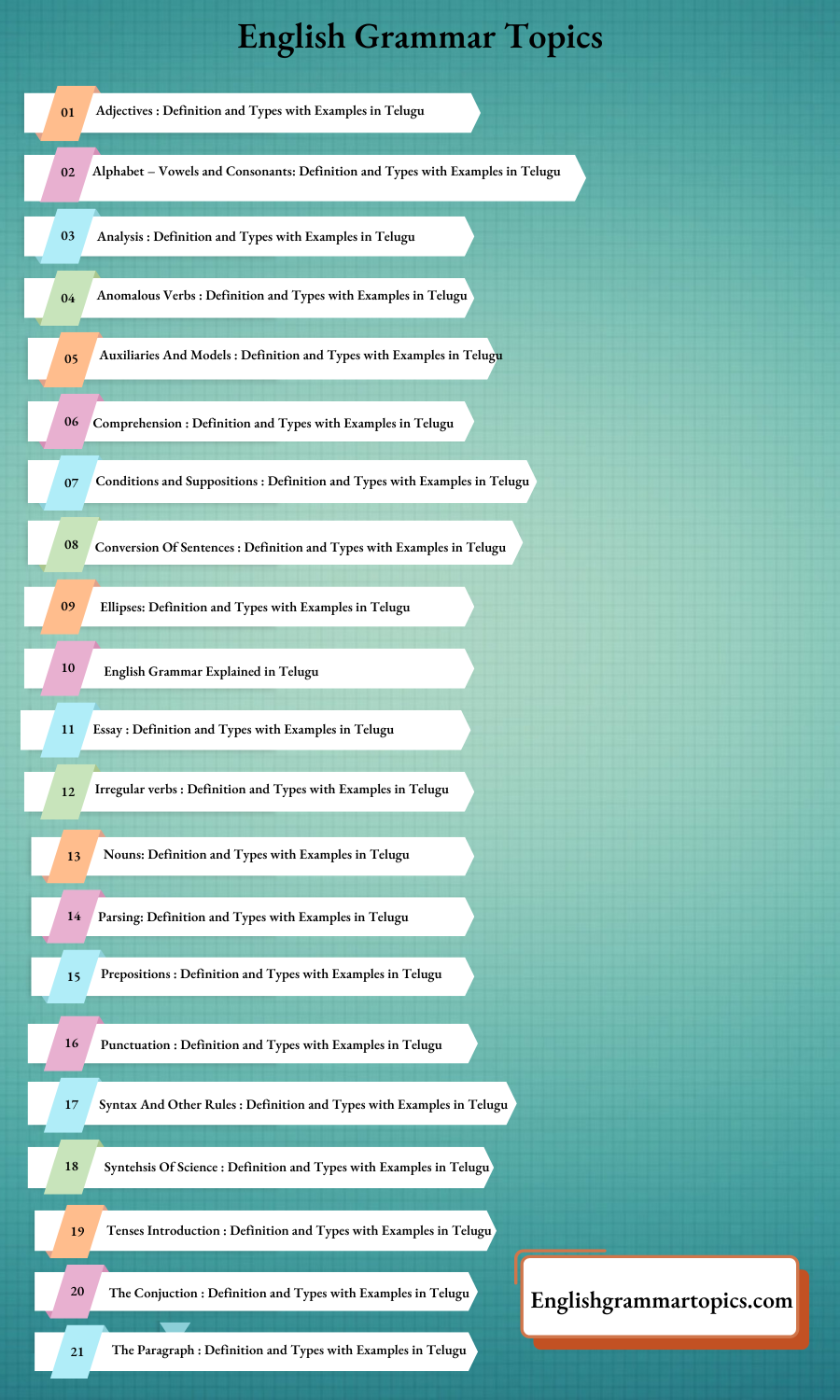(Nouns నామవాచకములు)
Classes of Nouns :- Nouns ఐదు విధములు
1. Proper
2. Common S
3. Collective
4. Material
5. Abstract.
Concrete
1. ప్రత్యేకముగా ఒక్కమనుష్యునకే గాని, ఒక్క స్థలమునకే గాని, ఒక్క వస్తువునకేగాని చెందునట్టి పేర్లు Proper nouns అనబడును.
Rama, Calcutta, India, the Ganges, the Ramayana.
Rama అను పేరు గలవారు చాలామంది యున్ననూ, Rama అని పిలిచినపుడు ఆ మాట ఒక్క మనుష్యునే తెలియజేయును.
Def:- A Proper noun is the name of only one person, place or thing.
Proper nouns descriptive sense లో ( అర్థవంతములుగా) ఉపయోగింపబడినపుడు Common nouns అగును. ఇట్లు:-
(a) Shakespeare is the greatest dramatist of England-noun.
(b) Kalidas is the Shakespeare (- the greatest dramatist) of India – Common noun.
మొదటి వాక్యమునకు అర్ధము
Proper, Common, Collective and Material nouns denote things that exist in a material form; hence they are called concrete nouns. An Abstract noun denotes something that has no separate existence of its own, but exists only in persons or things.

Read and Learn more English Grammar Topics
Shakespeare అనునతడు England దేశమున నాటకరచయితలలో మిక్కిలి గొప్పవాడు; అపుడు ‘Shakespeare’ అను పదము ఒక మనుష్యుని పేరు గావున అది proper noun అగును.
రెండవ వాక్యమునకు అర్ధము ఇంగ్లండు దేశమునకు Shakespeare నాటక రచనలో ఎంతగొప్ప వాడో హిందూదేశమునకు Kalidas అంతగొప్పవాడు. అపుడు ‘Shakespeare’ అను పదము యొక్క పేరుగాక, నాటకరచనలో మిక్కిలి గొప్పవాడని యర్థమిచ్చుచున్నది. కనుక Shakespeare అనుమాట యీ వాక్యములో Common noun అగును.
ఉ: He is the Solomon (the wisest man) of the age.
2. ఒకేజాతిలో ప్రతివస్తువునకుగాని, వ్యక్తికిగాని, చెందదగిన పేర్లు Common nouns అనబడును. ఉ: dog, town, table.
Def: A common noun is the name that can be given to all things or persons of the same class or kind.
3. మనుష్యుల యొక్క గాని, జంతువుల యొక్క గాని, వస్తువుల యొక్క గాని గుంపులను తెలియజేయు పేర్లు Collective nouns అనబడును.
ఉ :- army, crowd, flock, herd, fleet, pack, bunch
Def: A collective noun denotes a number of persons, animals or things taken as one.
4. సాధారణముగ విడిభాగముల నుద్దేశింపక ఒకే పోగుగాగాని, ముద్దగాగాని ద్రవముగా గాని, వాయువుగా గాని పేర్కొను పదార్థముల పేర్లు, Material nouns అనబడును. ఉ: rice, sand, clay, chalk, coal, mud, iron, gold, silver, milk, water, oil.
Def: A Material noun is the name of some material or substance which is supposed to have no separate parts. Material nouns పదార్థ భేదములనుగాని, పదార్థ భాగములను గాని పదార్ధముతో చేయబడు వస్తువులు గాని, తెలియజేయునపుడు common nouns అగును.
Material noun
Common noun
1. Rice is eaten by the people of Southern India. 1. Rice is a plant.
2. Oil 2. Oils (different kinds of oil)
3. Stone 3. Stones (separate pieces of stone).
4. (a) Copper (metal) 4. (a) Copper (coins made of copper).
(b) Tin (metal) (b) Tins (cans made of tin)
5. (a) తెలుపు, ఎరుపు, పొడుగు, మంచితనము, పెద్దతనము మొదలగు గుణముల పేర్లును; (b) నడక, చూపు, ఎగురుట మొదలగు పనుల యొక్క పేర్లును; (c) బీదతనము, పసితనము, సంతోషము మొదలగు స్థితుల యొక్క పేర్లును ; (d) వ్యాకరణము, సంగీతము, జ్యోతిష్యము మొదలగు శాస్త్రముల లేక కళల పేర్లును Abstract nouns అనబడును.
(a) Qualities (are): Whiteness, redness, goodness, cleverness, height, length.
(b) Actions (3e): walk, sight, flight, laughter, choice, pain.
(c) States(): poverty, childhood, pleasure, youth, health, sleep.
(d)* (i) Arts (5): poetry, music, dance.
(ii) Sciences (e): astronomy, grammar.
Def:- An Abstract noun is the name of any quality, state or action, art or science.
Abstract nounsవస్తువులను తెలియజేయునపుడు Common nouns
అగును.
Beauty
1. The quality of being beautiful– Abstract as in ‘Beauty’ is admired.
2. A person possessing beauty — Common as in ‘She is a beauty’
Speech
1. The power of speaking– Abstract as in Speech, is divine.
2. The speech delivered Common as in ‘He delivered a good speech”.
N.B. Proper nouns, material nouns, abstract nouns మూడును common nouns గా వాడబడినపుడు సాధారణముగా వాని ముందు వచ్చును.
Formation of Nouns
Abstract nouns are chiefly formed from :-
(a) Adjective: wise – wisdom; idle – idleness.
(b) Nouns
friend – friendship; thief-theft;
(c) Verbs: See-sight; think – thought.
Ex. 19B.
Form Abstract Nouns from the following words :-
Long; Strong; Obey; Boy; Agent; Wide; Woman; Young; Cruel; Hate; Protect; Advise; Die; Punish; Succeed; Coward; Captain; Judge; Poor; High; Just; Broad; Proud; Brave; Good; True; Deep; Dark.
Ex. 20
Name the class to which each noun in the following belongs:
1. My brother is called Govind. 2. Tea comes from China. 3. Birds build nests. 4. Asia is larger than Africa. 5. My uncle has a house in Bombay. 6. John gave his book to James. 7. The city of London has many fine buildings and streets. 8. Iron is the most useful of all metals. 9. Coal is used for steam engines. 10. Castor oil is lighter than water. 11. The sweetness of honey is not like that of sugar. 12. Bring some paper and pens. 13. 1 saw a crowd of people. 14. A wolf entered a flock of sheep.
Gender (లింగము)
Genders మూడు విధములు కా
1. Masculine(పుంలింగము) 2. Feminine(స్త్రీలింగము) 3. Neuter
(నపుంసక లింగము)
1. Boy, bull, man అనునవి మగవి.
2. Girl, cow, woman అనునవి ఆడవి.
3. Stone, book, table అనునవి ఆడవి కావు, మగవి కావు. అవి ప్రాణము లేనివి.
కాబట్టి సమస్త వస్తువులు (a) మగవి యని (b) ఆడువి యని మగా, ఆడు భేదము లేనివి అని మూడు విధములుగా భాగింపబడినవి.
వీనిలో ఏ తరగతికి చెందినదియో తెలియజేయు నామవాచకము యొక్క రూపమునకు Gender (లింగము) అని పేరు.
Def: Gender is that form of the Noun which shows whether what is spoken of is male, female or neuter.
1. మగజాతిని తెలియజేయు పేర్లు Masculine Gender(పుంలింగము)
అగును……
అగును.
అగును.
The names of males are of the Masculine Gender. 2. ఆడు జాతిని తెలియజేయు పేర్లు Feminine Gender(స్త్రీలింగము)
The names of females are of the Feminine Gender.
3. ప్రాణములేని వస్తువుల పేర్లు Neuter Gender (నపుంసక లింగము)
The names of things without life are of the Neuter Gender.
Note :- మగజాతికి, ఆడుజాతికి గూడ చెందు పేర్లు Common Gender (ఉభయ లింగము) అగును. ఉ child, servant, deer, orphan, cousin, parent, people, person.
N.B. Cousin brother, Cousin sister అను ప్రయోగములు తప్పు.
Note:- Nouns (JJ) Personal Pronouns
(సర్వనామములు) కు గూడ లింగభేదము గలదు.
Masculine: he, his, him.
Feminine: She, her, hers.
Neuter:- it, its.
Common
our, them, us, etc.)
Pronouns you (i.e. I, you, they,
లింగ భేదమును తెలియజేయు రూపములు మూడు విధములుగా..
నేర్పడును.
1. Masculine (పుంలింగ రూపమున ess చేర్చుట చేతను.
lion – lioness
2. Sex 30
he, she, man, woman or
ad, lord lady, cock, hen వంటి మాటలను Nouns కు వెనుక గాని, తరువాతగాని యుంచుట చేత.
so
he-goat, she-goat, man-servant, woman-servant;
land-lord; land-lady etc.
3. ప్రత్యేకముగా వేఱుమాట లుపయోగించుట చేతను :
boy, girl, brother, sister.
1. By adding ess
| Masculine | Feminine | Masculine | Feminine |
| Lion | Lioness | Master | Mistress |
| Tiger | Tigress | Emperor | Empress |
| Poet | Poetess | God | Goddess |
| Author | Authoress | Count | Countess |
| | | |
2. By placing a word before or after
| Masculine | Feminine | Masculine | Feminine |
| He-buffalo | She-goat | Pea-cock | Pea-hen |
| He-buffalo | She-buffalo | Cock-sparrow | Hen-sparrow |
| Man-servant | Maid-servant | Milk-man | Milk-maid |
3. By using a different word
| Masculine | Feminine | Masculine | Feminine |
| Boy | Girl | King | Queen |
| Husband | Wife | Nephew | Niece |
| Cock | Hen | Uncle | Aunt |
| Son | Daughter | Sir | Madam |
| Man | Woman | Gentleman | Lady |
| Horse | Mare | Father | Mother |
| Dog | Bitch | Brother | Sister |
| Ram | Ewe | cow | Bull |
Write again using the other gender of the nouns and pronouns in:-
1. He is ten years old. 2. Has he any brothers? 3. Where is his father? 4. He lives with his father. 5. The king loves his daughter. 6. The prince spoke to his brother. 7. He has three brothers and two daughters. 8. I know his father. 9. She lives with her grand-father. 10. The queen is very kind to her sons and brothers. 11. The boy lives with his mother. 12. The man shot the lion and the tiger with a gun. 13. Many men want to see the queen. 11. All my sons and sisters saw the king. 15. That man and his wife were at the meeting. 16. Both father and son went to Calcutta.
Ans: 2. Has she any sisters? 6. The princess spoke to her sister. 10. The king is very kind to his daughters and sisters. 12. The woman shot the lioness and the tigress with a gun. 15. That woman and her husband were at the meeting. 16. Both mother and daughter went to calcutta.
వచనములు రెండు
Number (వచనము) .
1. Singular number
2. Plural number (బహువచనము)
1. ఒక వస్తువును మాత్రము తెలియజేయు నామవాచకములు కొన్ని చెప్పుము. boy, book, slate ఇట్టి Nouns, Singular number (ఏకవచనము) లో నున్నవని అందురు.
Def: When a noun denotes only one thing, it is said to be in the Singular number.
2. ఒకటికంటే ఎక్కువ వస్తువులను తెలియజేయు నామవాచకములు కొన్ని చెప్పుము. boys, books, slates. ఇట్టి Nouns Plural number (బహువచనములు)లో నున్నవని అందురు.
Def:- When a noun denotes more than one thing it is said to be in the Plural number.
1. సాధారణముగా Singular కు చేర్చుట చేత Plural అగును. ఉ- boy-boys; girl-girls; cat-cats.
2.చివర s, sh, x, ch, (not sounded like k) o onouns కు ఆ చేర్చుటచే బహువచన మేర్పడును.
es
ass-asses; brush- brushes; box-boxes; bench- benches; negro- negroes;
Note: Monarch అను మాటలోని ch ‘క’ కారపలుకుబడి గలది కావున, దాని బహువచనము ‘S’ చేర్చుట చేతనే ఏర్పడును : ఇట్లు Monarchs. 3. చివర / గాని fe గాని ఉన్న Nounsలో / ని గాని fe ని గాని TES క్రింద మార్చుటచే బహువచన మేర్పడును. ఉ:- leaf-leaves, wife-wives.
4. చివర యం ముందున్న హల్లు nouns విషయములో y ని ies క్రింద మార్చుటచేత బహువచన మేర్పడును.
ఉదా : Sky-Skies, lady-ladies.
5. చివరనున్న y కి ముందు vowel ఉన్న nouns విషయములో s చేర్చుటచేతనే బహువచన మేర్పడును. ఉ: day-days..
6. కొన్ని Nouns కు en చేర్చుటచేతగాని, వానిలోనున్న అచ్చులను మార్చుటచేతగాని వాని బహువచన మేర్పడును. ఉ :- ox-oxen, child-
children, man-men.
| Singular | Plural | Singular | Plural |
| 1. (a) Boy | Boys | Cow | Cows |
| 2. (a) Ass | Asses | Gas | Gasses |
| (b) Fish | Fishes | Bush | Bushes |
| (c) Fox | Foxes | Tax | Taxes |
| (d) Bench | Benches | Watch | Watches |
| (e) Mango | Mangoes | Hero | Heroes |
| (i) Buffalo | Buffaloes | Potato | Potatoes |
| Canto | Cantos | Photo | Photos |
| Dynamo | Dynamos | Bamboo | Bamboos |
| 3. (a) Calf | Claves | Wolf | Wolves |
| Loaf | Loaves | Thief | Thieves |
| Half | Halves | Shelf | Shelves |
| Self | Selves | Myself | Ourselves |
| Singular | Plural | Singular | Plural |
| Hoof | Hoofs | Proof | Proofs |
| Roof | Roofs | Chief | Chiefs |
| Gulf | Gulfs | Dwarf | Dwarfs |
| b) Knife | Knives | Life | Lives |
| Safe | Safes | Strife | Strifes |
| 4. Fly | Flies | Duty | Duties |
| City | Cities | Army | Armies |
| Baby | Babies | Story | Stories |
| 5. Key | Keys | Monkey | Monkeys |
| Toy | Toys | Play | Plays |
| 6. Woman | Women | Goose | Geese |
| Foot | Feet | Mouse | Mice |
| Tooth | Teeth | Cow | Kine |
| Brother | Brothers | Louse | Lice |
Note:- 1. Sheep, deer, swine are both singular and plural. Trousers and scissors are always plural.
But: a) A pair of scissors is lying on the mat.
b) More than one was killed.
Note:- News and Innings are always singular and Tidings is both singular and plural.
Note :- 3. Number అనుమాటకు వెనుక à ఉన్నప్పుడు plural verb ను. the ఉన్నప్పుడు singular verb ను వాడవలయును. ఉ:- 1. A large number of people were present.
2. The number of passes in our school this year is very low. Note:- 4. The singular form half, and the plural forms heaps and lots take.
1) a singular verb, when followed by the singular noun
or pronoun with of:
–
e.g. 1. Half of (it) our heavy task was done.
2. There is heaps of (it) ammunition left on the
battle field.
3. There is lots of (it) work to do.
2. a plural verb, when followed by the plural noun or pronoun with if:
e.g.- – 1. Half of (them) the apples are bad.
2. There are heaps of (them) cups.
3. Lots of (them) people think so.
Ex. 22
(a) Recast the following sentences using the Plural of the nouns and pronouns in:-
1. His foot is long.
2. The child is eating a mango.
3. There is a green leaf on the tree.
4. This house has a straw roof.
5. Is he an idle boy?
6. Am I not a schoolboy?
7. The mouse has run away.
8. He does not go to his house.
9. Isn’t it my pen?
10. This is a sharp knife.
11. The girl is eating a loaf.
12. The cow loves its calf.
13. His wife is a good woman.
14. Was the thief caught?
15. The cooly does his work well
16. The ox has come home.
17. He loves his parents.
18. This story is very nice.
19. Dost thou take coffee every morning?
20. I get up early.
21. She shall be punished for her negligence.
22. Where is your mango?
23. My teacher punished me.
24. 1 educated him.
Ans:- 4. These houses have straw roofs. 6. Are we not schoolboys? 8. They do not go to their houses. 12. The cows love their calves.
(b) Recast the following sentences using the Singular of the nouns and pronouns in:-
1. These are long words.
2. What are these?
3. They are not teachers.
4. We are men.
5. Aren’t they our pens?
6. Whose pencils are these?
7. Are they not knives?
8. Women are milking the cows.
9. We shall become rich.
10. Where are the calves?
11. The geese were stolen.
12. Our teeth are painful.
13. The ladies were seated.
14. They read their lessons well.
15. Cows give milk.
16. Dogs are very useful animals.
17. They have killed the wolves.
18. We are very tired.
19. Birds are flying.
20. They are not pens.
21. They are very pleased with the performance.
Ans: 1. What is this? 3. He (or she) is not a teacher. 4. I am a man. 5. Isn’t my pen? 14. He reads his lesson well. 16. The dog is a very useful animal.
c) Recast the following sentences using the other Numbers of the nouns and pronouns in:
1. The man eats a mango.
2. The boys are eating oranges.
3. They are good boys.
4. They have nice caps.
5. The boy goes to school.
6. A bird flies in the air.
7. The goat is eating a leaf.
8. My hand is clean.
9. I see a blackboard.
10. Whose book is this?
11. What is he doing?
12. There are fruits in the boxes.
13. There is a flower on the tree.
14. The child is playing.
15. I want to sell this book.
16. Are you a fisherman?
17. I am a school boy.
18. Has he caught a fish?
19. Where is his book?
20. My teacher was angry.
21. What do they do?
22. Are your hands clean?
23. This is my foot.
24. Where are they going?
25. My tooth is giving pain.
26. Their feet are long.
27. We saw the child.
28. The sheep was sleeping.
29. That is a big room.
30. When was I born?
Ans:- 1. Men eat mangoes. 4. He has a nice cap. 7. The goats are eating leaves. 12. There is a fruit in the box. 16. Are you fishermen? 18. Have they caught fishes? 21. What does he do? 25. Our teeth are giving pain. 26. His foot is long. 28. The sheep were sleping. 30. When were we born?
1. A Pronoun
It is I
2. An Adjective
Noun equivalents
(a) With the
(a) We must be kind to the poor (=poor people)
(b) In the dead of winter..
(c) He took a turn for the better.
(b) Without the.
(a) Rich and poor, old and young, good and bad suffered alike. (ii) He went from bad to worse.
(c) In such well-known phrases as:
1. In short 2. For better 3. For worse 4. The long and the short
of it. 5. At last
3. Adverb:
Till now, for ever, from here.
Note-Here the adverbs are used as nouns, governed by prepositions.
A verb – noun:
(a) (i) To see is to believe. (Simple infinitive)
(ii) To err is human.
(b) Seeing is believing, (Gerund)
(c) The reading of novels is my hobby. (Verbal noun) (d) His frequent comings and goings. (Nouns)
A verb-adjective (Principle)
(a) The living and the dead.
(b) The killed and wounded.
A word or group of words quoted.
(a) ‘And’ is a conjunction.
(b) I think so’ was all that he said.
A word or group of words italicised: (a) Quickly is an adverb.
(b) To err is an infinitive.
(c) That he is a good boy is a noun clause. A phrase:
(a) Tell me where to search for it :
(b) How to get them is the question. A noun clause in a Complex Sentence: Tell me what you mean.
Case (విభక్తి)
‘Rama took Gopal’s book’ అను వాక్యమునకు అర్ధమేమి? ‘రాముడు గోపాలుని యొక్క పుస్తకమును తీసికొనెను’ అని అర్ధము. వాక్యములోని క్రియయేది? Took ఈ పనిని ఎవరు చేసిరి? Rama; కనుక took అను మాటకును Rama అను మాటకును ఎట్టి సంబంధము గలదు? ఆ పనిని చేయు సంబంధము Rama కు గలదు. అనగా took అను క్రియకు Rama అనునది subject గా నుండు సంబంధము గలది.
పై వాక్యములో Rama దేనిని తీసికొనెను? Book ను తీసికొనెను. కనుక book అను మాటకు took అను మాటకు గల సంబంధ మెట్టిది? book నకు ఆ పనియొక్క ఫలము అనుభవించు సంబంధముగలదు. అనగా took అనుక్రియకు book అనుమాట object గా నుండు సంబంధము గలది.
Book ఎవరికి చెందియున్నది? Gopal నకు కాబట్టి book నకును Goapl నకును గల సంబంధమెట్టిది? హక్కు సంబంధము గలదు. అ పుస్తకము యొక్క హక్కు Gopal ది. అట్లయిన Gopal అను మాటకు చివర యేమి యున్నది. పైన ఒక comma యును, దాని తరువాత 5 ను ఉన్నవి. ఈ గుర్తు (s) ను apostrophe and s అందురు. ఈ గుర్తు ఏమి తెలియజేయును? హక్కు సంబంధము తెలియజేయును.
Subject గా నుండు పంబంధమును తెలియజేయు Rama అను మాటకు చివర గుర్తు ఏమైనా యున్నదా? లేదు. Object గా నుండు సంబంధమును తెలియజేయు book అను మాటకు చివర గుర్తున్నదా? లేదు. కనుక Subject గా నుండు సంబంధముగాని Object గా నుండు సంబంధముగాని తెలియజేయునపుడు నామవాచకముయొక్క రూపము మార్పు జెందదు. కాని హక్కును తెలియజేయునపుడు మాత్రము నామవాచకము యొక్క రూపము మార్పు జెందును. (as in : Gopal’s).
ఇట్టి సంబంధమునకు ( అనగా Subject గా గాని Object గా గాని ఉండు) గాని, హక్కు సంబంధము తెలియజేయు మార్పునకు (as in : Gopal’s) గాని Case (విభక్తి) అని పేరు.
ఒక వాక్యములో noun (or pronoun) కును, ఇతర మాటలకును గల సంబంధమునకు గాని అట్టి సంబంధమును తెలియజేయువాని రూపమునకు గాని Case (విభక్తి) అని పేరు.
Def: The relation in which a Noun or ‘Pronoun stands in some other word in the sentence, or the form which shows such relation, is called its Case.
తెలుగు భాషలో ఎనిమిది విభక్తులు గలవు. కాని ఇంగ్లీషు భాషలో నాలుగు విభక్తులే గలవు.
విభక్తి ప్రత్యయముల
ప్రథమా విభక్తి (Subjective case *) డు, ము, వు, లు.
చేత (న్), చే(ఎ) తోడ (న్), తో(న్).
కొఱకు (న్), కె
ద్వితీయా విభక్తి .
వి (ఎ) గూర్చి గుణించి.
త్వతీయా విభక్తి
చతుర్థీ విభక్తి.
పంచమీ విభక్తి
షష్ఠీ విభక్తి.
సప్తమీ విభక్తి.
వలన (న్), కంటే (న్), పట్టి
కి (న్) కు (ఎ) లో (న్), లోపల (న్) యొక్క అందు (న్), న (న్).
దీనినే Nominative case అని కూడ అందురు.
సంబోధన ప్రథమా విభక్తి Nominative of address or Vocative case..
0, 08.
ఈ విభక్తికి మొదట ఓ, ఓరి, ఓయి, ఓసి, అనునవి కూడ చేరును. మొదట ఏడు విభక్తులలోని ప్రథమా విభక్తియు, షష్ఠీ విభక్తిలోని ” యొక్క” గాక, తక్కిన విభక్తులన్నియు Objective case అగును.
by, for, from, of, in, etc. prepositions మూలమున, How to tell the Case Object (కర్త) ఎప్పుడును Subjective case (ప్రథమా విభక్తి) లో ముండును. Object(కర్మ) ఎప్పుడును Objective case లో నుండును.
Possessive case, ఒక వస్తువు ఎవరికి చెందినదియు చెప్పును. Gopal’s book అనునపుడు Gopal అనువానికి book చెందియున్నది. అని అర్థము. ఎవని యొక్క పుస్తకము అను ప్రశ్నకు సమాధానము Gopal’s అయి యున్నది. అందుచే Gopal’s అనునది possessive case (షష్ఠీ విభక్తి) లో నున్నది. ఇచట ప్రశ్నలోని ‘యొక్క’ అనునది షష్ఠీ విభక్తి ప్రత్యయమని
గమనింపవలయును.
Pronouns విషయములో వాని రూపభేదమే case ను తెలియజేయును.
my, your, their, me, I, she, her etc.
Vocative case పిలుచుటయందు ఉపయోగింపబడును. ఉ:0 Rama come here; O God, forgive me; Boys, sit down; వీనిలో God and Boys అనునవి Vocative case లో నున్నవి. Note: 1. The dog is a faithful animal. = కుక్క విశ్వాసము గల జంతువు. 2. 1 beat a dog – నేను కుక్కను కొట్టితిని..
ఒకే మాట dog అనునది. మొదటి వాక్యములో Subjective case లోను రెండవ వాక్యములో Objective case లోను, ఉన్నప్పటికీ, ఆ మాటకు రూపభేదము లేదు. కావున ఒక noun Subjective అయినదియు, Objective అయినదియి, రూపభేదమును బట్టి English భాషలో చెప్పుటకు వీలులేదు. కాని తెలుగు లో విభక్తి ప్రత్యయముల సహాయమున చెప్పవచ్చును. రెండవ వాక్యములోని విభక్తి ప్రత్యయము “ను” “కుక్క” Objective case అని తెలుపును.
క్రియకు ముందు “ఎవడు” (లేక ఎవరు? ఏది? ఏవి) అను మాటను ఉంచి ప్రశ్న వేయగా వచ్చు జవాబే Subject(కర్త) అగును. ఇచట “ఎవడు” లోని ‘డు’ ప్రథమా విభక్తి (Subjective case) ప్రత్యయమని గమనింపవలెను.
క్రియకు ముందు ‘ఎవనిని’ (లేక ఎవరిని, దేనిని, వేనిని) అను మాటను ఉంచి ప్రశ్నవేయగా వచ్చు జవాబే Object (కర్మ) అగును. ఇచట “ఎవనిని” ” లోని “ని” ద్వితీయా విభక్తి (Objective case) ప్రత్యయమని గమనింపవలయును. Pronouns విషయములో ‘you, it’ తప్ప తక్కిన వానికి case, రూపభేదముచే చెప్పవచ్చును. ఉ:
Sub. Case. I, we, Thou, he, she, they, who.
Obj. Case: me, us, thee, him, her, them, whom
A noun or pronoun after a preposition is also in the Objective case. Ex. The book is on the table. He is angry with me.
Note : వాక్యములో తఱచుగా మొదట Subject తరువాత Verb దాని తరువాత Object 3. (Subject, Verb, Object).
Possessive case లో నున్నదియు లేనిదియు తెలిసికొనుటకు, noun తరువాత apostropheands (‘s) గాని apostrophe () గాని యున్నది లేనిది. చూడవలయును.
1. ప్రాణము గలవాని పేర్లకును, (a) కాలమును (time) (b) అవకాశము (space) (c) తూనికను (weight) తెలియజేయు మాటలకుమాapostrophe and s (‘s) చేర్చబడును. ఉ :-
1. Rama’s book, Dog’s tail. (2) (a) A week’s journey,
(b) A hair’s breadth, (c) Apound’s weight.
కాని ప్రాణములేని వాని పేర్లకు ‘s చేర్చబడదు. “The table’s leg” “The house’s roof” e es. “The leg of the table” “The roof of the house” అని చెప్పవలయును. SDA ship’s doctor, Fingers, ends; At wit’s end e ప్రయోగములు కలవు.
ఏకవచనములో నుండు నామవాచకమునకు ‘S’ చేర్చుటచే Posses sive case boy. The bird’s wings; The girl’s slate; The Prince’s palace. బహువచనములో నుండు నామవాచకమునకు చివర 3 గాని ఆ గాని ఉండిన, Possessive case ఏర్పడుటకు ఆ 5 తరువాతగాని 25 తరువాతగాని apostrophe (“) 35. s. birds, wings; girls, slates, princes’ palaces, foxes’ tails, asses’ burden; horses’ manes.
కాని బహువచన నామవాచకమునకు చివర 5 లేనపుడు $ చేర్చుటచే, Possessive case or youngmens’ club, children’s kites, women’s society.
The Possessive (=genitive) case generally denotes ‘possession’ or ‘ownership; as: (a) Rama’s coat = The coat possessed by Rama. (b) Krishna’s house = The house owned by Krishna.
But the idea of ownership is not applicable to the follow- ing genitives, which denote the idea ‘connected with’ or ‘be- longing to’, but not ‘owned by’ as :-
(1) Caesar’s murderers = Those who murdered Caesar.
(2) Caesar’s victories = Victories that Caesar won.
(3) A girls’ school = A school meant for girls, but not ‘a school owned by girls’.
(4) The slave’s master = The person who is the master of the slave.
(5) A nine days’ wonder = A wonder which lasts nine days.
(6) A month’s time = Time that terminates within a month.
(7) A stone’s throw = distance, by which a stone can be thrown (=a slight distance).
(8) Scio’s rocky isle = the rocky isle called Scio.
It is clear from the above that the genitive has different meanings in different instances.
Another use of the genitive case is to express a place, house, shop, etc. as: (1) Please take this to the doctor’s (=doctor’s house) (2) I went to St. Paul’s (=St. Paul’s Cathedral). (2) I joined Pachayappa’s (=Pachayappa’s college). (4) You can get this at the grocer’s (=grocer’s shop).
Note:- (1) ఏకవచనములో చివర 5 గల nouns విషయములో ఆ noun s చేర్చి ఉచ్చరించునపుడు, ఆ చే:
(a) క్రొత్త syllable(pronouncediz) ఏ్పడకపోయినచో అటువంటి nouns కు apostrophe గుర్తు (1) మాత్రము చేర్చుటచే possessive case, 5. The Prince of Wales’ visit: Dr. Goebels’ speech.” (b) క్రొత్త syllable (pronounced iz ) ఏర్పడినచో అటువంటి nouns కు apostropheand’s (‘s) చేర్చుటచే possessive caseఏర్పడును.
Horse’s mane; fox’s tail; ass’s burden; Thomas’s denial; St. James’s Palace; Pythagoras’s theorem; Charles’s first Parlia- ment, Dulles’s death.Note (2) However, Greek classical names ending in s tend to break this rule by taking only the apostrophe (“), even if the following word does not commence with a sibilant (=hissing letters, sh, x or their hissing sounds); as:-
Achilles’ heel; Euripedes’ dramas; Socrates’ pupils; Brutus’ speech; Perseus’ sandals; Menelaus’ spear.
However, the apostrophe and s (‘s) are added to English proper nouns ending in ‘s (which therefore look like plurals; as:- Dickens’s novels; Keats’s poems (to avoid confusion).
(a) Dickens’ novels – is wrong, because it looks like a plural possessive.
(b) Dicken’s novels is wrong, because it means ‘the novels of Dicken’.
Note: (3) In the following cases s is omitted after the apostrophe, lest it should lead to cacophony (=ugly sound of words, as :-
(a) s తో ప్రారంభమై, 5 తో అంతమగు చివర syllable గల proper nouns విషయములో apostrophe (‘) మాత్రము చేర్చుటచే possessive case ఏర్పడుచున్నది. ఉ Moses’ laws; Jesus’ sake, Cassius’ dagger.
(b) If a word of two or more syllables ending in a sibilant is followed by a word commencing with a sibilant, only the apostrophe (‘) is used; as:
Conscience’ sake; goodness’ sake; but horse’s skin; for (i) a new syllable (pronounced iz) is formed – Vide Note (1) (b) secondly horse is a word of one syllable.
Note:- (4) A group of words treated as a noun takes the apostrophe and s (‘s) at the end; as :-
(a) My brother-in-law’s house; somebody else’s money; the Governor of Bombay’s residence.
(b) Only a noun put in apposition takes the apostrophe and s (‘s) but not the first word; as: My brother, Krishna’s marriage.
N.B.-There is a laudable tendency in modern usuage to omit the apostrophe, especially in plural nouns, where the nouns are adjectival without any real possessive sense as :- Girls school; students Union; Miners Federation.









